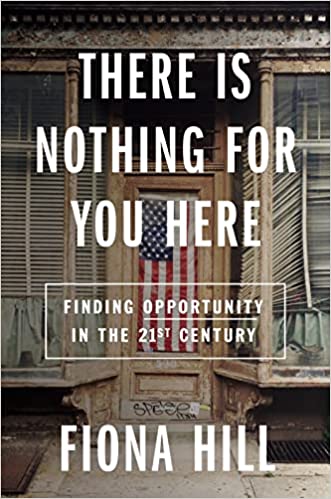
By Natylie Baldwin, Antiwar.com, 12/21/21
Considering that this is a memoir of a woman whose claim to fame is being a Russia expert and a celebrated biographer of Putin, I was expecting substantive discussion of contemporary Russia to be a significant part of the book. That was not the case, however, as her real experience with Russia seems to have occurred from the late 1980’s through the early 2000’s. This experience is weaved into her general biography but it doesn’t provide the necessary insight to understand the current state of affairs in the country or the problems that have come to a head recently between Russia and the west.
Hill did not start out as a privileged insider but came from a hardscrabble working class background in Northeast England, which makes her down-to-earth and relatable. She describes how the neoliberal and deindustrialization policies of the 1970’s and 1980’s personally affected her family and many others in the UK and how she observed similarities in certain regions of the U.S. after she moved there. She draws parallels on the dynamics behind this and the economic collapse Russia went through in the 90’s – a theme I have also explored. She is to be lauded for bringing the details of this topic to the professional educated class that will most likely be reading her book. Where she tends to go off the rails is what she says – and doesn’t say – about Putin era Russia.
From what I can ascertain from her telling, she spent significant time on the ground in Russia off and on from 1987 through the early 2000’s. She goes into the most detail about her travels to Russia as an exchange student during the Gorbachev era and then again while pursuing her PhD during the 1990’s. During the former, she describes Moscow as bleak and run-down with crumbling infrastructure and food shortages but an impressive public transportation system. During the latter, she describes the effects of the Shock Therapy program that transitioned Russia to a free market economy. She also goes into the travails of being a woman during this period of economic collapse and chaos where many Russian women turned to prostitution servicing relatively well-heeled western men. She relates an anecdote in which an elevator man at the Moscow hotel where she was bringing a delegation of Japanese businessmen to visit her academic sponsor assumed she was a call girl and was aggressively intent on getting a cut until the reality of the situation was explained to him – by a man, of course.
However, it doesn’t seem that she has spent any real time in Russia for most of the Putin era, with the exception of attendance at a couple of Valdai conferences. This leads me to believe that she is relying on information from the usual dubious sources in the political and media establishment about what contemporary Russia is like. This is evident from the few remarks she makes in passing.
First, she uses the term autocratic when referring to Putin’s Russia, which is inaccurate. Autocracy is absolute rule by one person. Anyone who has any depth of understanding of Putin era Russia knows that Putin does not rule absolutely. Similarly she uses the term populist in a somewhat pejorative sense to compare Putin to Donald Trump and Brexit cheerleader Nigel Farage: “They were charismatic leaders who dealt in pithy slogans that offered promises, not programs.” This is a gross oversimplification of Putin’s politics over the past two decades and implies that Putin has had a lack of political substance in his approach to addressing the numerous crises he inherited when taking over Russia. Putin is a pragmatist who had to learn on the job. There are still many problems to tackle but the command of many details of different areas of governance he has developed over time as demonstrated during lengthy Q&A sessions, speeches and press appearances, along with the concrete improvements he oversaw in poverty reduction, infrastructure investment, lowering crime and rebuilding a dilapidated military reveals this observation by Hill to be quite laughable….
Read full review here.
She grow up poor and then want to the best schools but then took the path that paid her the most.
https://www.amazon.com/Fiona-Hill/e/B001KHS324/ref=aufs_dp_mata_dsk
There’s a note on left of were she has worked and for who.
Then there’s this.
She is a member of the Council on Foreign Relations.
This tell what need to know about her and why she is so wrong on Russia
Just another so-called Russian expert that has sold herself to the Amerikas propaganda machine. Sadly there is only few that don’t published on lame stream media that can tell the truth.
Thanks NB
Thanks for the review. Ms. Hill’s views, notwithstanding her early biography, don’t surprise me, in view the fact that she was a student of Richard Pipes and Roman Szporluk at Harvard, who can qualify as Russophobes. It is curious that Michael Karpovich (1888-1959), often considered the father of Russian studies in the United States, during his 30-year tenure at Harvard (1927-1957) oversaw the beginnings of the careers of one or two generations of specialists of diametrically opposed viewpoints, including Pipes, Brzezinski, Martin Malia and the two people I studied with at Columbia, Marc Raeff and Leopold H. Haimson. The latter two had far more nuanced, less emotional (hysterical?) points of view on Imperial and Soviet history than their former classmates, so I consider myself to have benefitted enormously. Brzezinski and Pipes are Polish by origin, which perhaps explains part of their bias. But the diehard Russophobes in academia generally began their careers in the middle of the Cold War – they simply cannot see the world without that intellectual crutch – and they transmitted this pathology to the specialists they taught.
Thank you for sharing your experience and insight on these academic Russia experts.